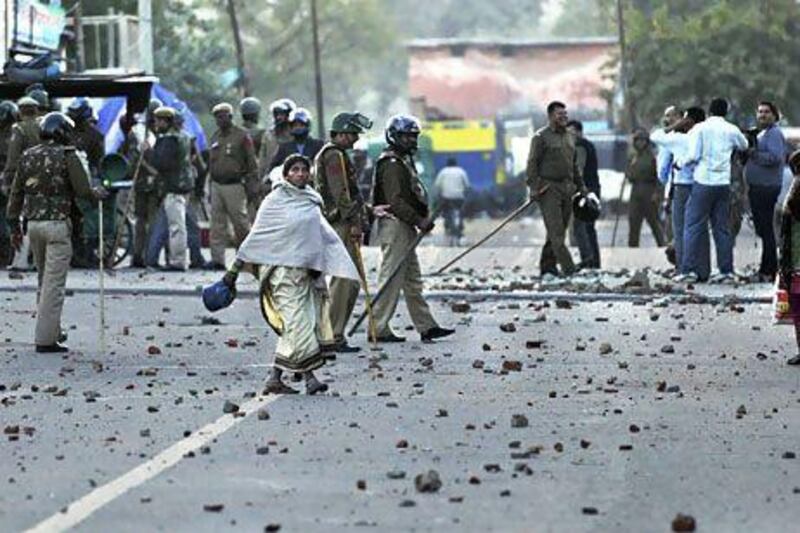NEW DELHI // As word spread that a seven-year-old girl had died from injuries resulting from a sexual assault at her school, a crowd of angry bystanders grew outside the New Delhi hospital where her body lay.
Except the girl had not actually died. And even though the girl and her parents appeared on a hospital balcony in an attempt to calm the throng, parts of the hospital were vandalised, three buses were set aflame and police were pelted with stones.
The rioting, in which at least 12 people were injured, resonated beyond the confines of the middle-class enclave of Mangolpuri in north-west Delhi where it took place this month. Child-rights experts said the rage was a telling sign that the mantle of secrecy over the problem of child sexual abuse in India was slowly lifting.
"If you look back 10 years ago, people were not willing to discuss these issues. What we are seeing now is how an incident has influenced them to break their silence, that it is OK to raise these issues and share it in the public space," said Vijaylakshmi Arora of Child Rights and You, a non-profit advocacy group.
Until recently, public discussion of child sexual abuse had been taboo in India, even though it is a well-documented scourge.
A government-sponsored survey in 2007, based on interviews with 12,500 children in 13 states, reported serious and widespread sexual abuse.
In a report issued last month, Human Rights Watch (HRW) said 7,200 children, including infants, were raped every year in India.
Relative to some other countries, this number is small - in the United States, for instance, there are about 60,000 cases of child abuse a year, according to federal health authorities.
Yet because the problem of child abuse in India is not widely acknowledged and there is widespread fear about reporting abuse to authorities, the actual number of cases is believed to be much higher, the HRW report said.
"Children are sexually abused by relatives at home, by people in their neighbourhoods, at school, and in residential facilities for orphans and other at-risk children," it said.
Many victims, the report added, are "mistreated a second time by a criminal justice system that often does not want to hear or believe their accounts, or take serious action against perpetrators".
As the risk of sexual assault to children becomes more widely known, parents of young children have become more aware - and afraid.
"I do not feel comfortable letting my child go play in the park," said Ms Arora. "We sit there and watch because we are afraid our children may get snatched or someone may lure them. There is fear every step of the way, from sending your child to school in a van and worrying about the van driver.
"In classrooms, in the bathrooms of classrooms. In parks and on the road. There is a clear recognition that this is not acceptable any more and that is why people are demanding accountability."
The alleged sexual abuse of the seven-year-old girl, a student in a government-run school in north-west Delhi, illustrates how far some authorities have come in dealing with allegations of child abuse - and how far there is still to go.
According to the police, the girl stepped out of her classroom for lunch, a service provided by the government to encourage students to remain in school. The girl did not leave the school grounds, yet did not return to the classroom until the end of the school day.
During dinner at her home that evening, her parents noticed her injuries and took her immediately to Sanjay Gandhi Hospital, where doctors confirmed that the girl had been sexually assaulted. Police said at least 200 people had been questioned in connection with the case, but no one had been charged or detained. The school's principal and four others - the school inspector, the girl's teacher, a school attendant and a security guard - have been suspended.
Public anger shows there is a demand for "answers, accountability, and that the authorities have yet to learn their lessons about to how to deliver effective justice on time", said Soumya Bhaumik, from the Centre of Social Research in New Delhi.





